Related Research Articles
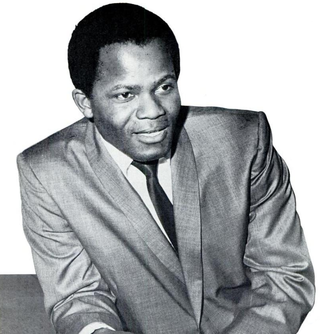
Yusuf Hazziez, known professionally as Joe Tex, was an American singer and musician who gained success in the 1960s and 1970s with his brand of Southern soul, which mixed the styles of funk, country, gospel, and rhythm and blues.

Benjamin Franklin Peay, known professionally as Brook Benton, was an American singer and songwriter whose music transcended rock and roll, rhythm and blues, and pop music genres in the 1950s and 1960s, with hits such as "It's Just a Matter of Time" and "Endlessly".

Tapestry is the second studio album by the American singer-songwriter Carole King. Produced by Lou Adler, it was released on February 10, 1971, by Ode Records. The album's lead singles, "It's Too Late" and "I Feel the Earth Move", spent five weeks at number one on both the Billboard Hot 100 and Easy Listening charts.
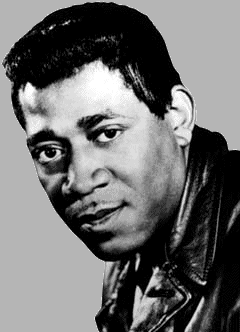
James Edward Carr was an American R&B and soul singer, described as "one of the greatest pure vocalists that deep Southern soul ever produced".
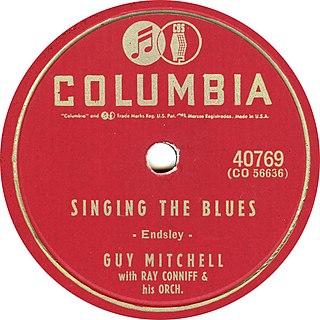
"Singing the Blues" is a popular song composed by Melvin Endsley and published in 1956. The highest-charting version was by Guy Mitchell and the first recording of the song was by Marty Robbins. It is not related to the 1920 jazz song "Singin' the Blues" recorded by Frank Trumbauer and Bix Beiderbecke in 1927.

Reggie Grimes Young Jr. was an American musician who was lead guitarist in the American Sound Studio house band, The Memphis Boys, and was a leading session musician.
"Bad, Bad Leroy Brown" is an uptempo, strophic story song written by American folk rock singer Jim Croce. Released as part of his 1973 album Life and Times, the song was a No. 1 hit for him, spending two weeks at the top of the Billboard Hot 100 in July 1973. Billboard ranked it as the No. 2 song for 1973.

Melba Joyce Montgomery was an American country music singer and songwriter. She was known for a series of duet recordings made with George Jones, Gene Pitney and Charlie Louvin. She was also a solo artist, having reached the top of the country charts in 1974 with the song, "No Charge". Born in Tennessee but raised in Alabama, Montgomery had a musical upbringing. Along with her two brothers, she placed in a talent contest which brought her to the attention of Roy Acuff. For several years she toured the country as part of his band until she signed with United Artists Records in 1963.
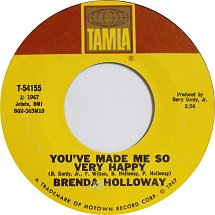
"You've Made Me So Very Happy" is a song written by Brenda Holloway, Patrice Holloway, Frank Wilson and Berry Gordy, and was released first as a single in 1967 by Brenda Holloway on the Tamla label. The song was later a huge hit for jazz-rock band Blood, Sweat & Tears in 1969, and became a Gold record.

The singles discography of American singer Patti Page contains 127 singles as a lead artist, seven as a collaboration with other artists, seven for the Christmas music market and 19 other charted songs. Page's singles were released for nearly 20 years on Mercury Records. Her debut release was 1947's "Every So Often". In 1948, Page had her first charting release with "Confess", peaking at number 12 on the American Billboard Hot 100. Four more singles reached the top 20 or 30 on the chart in the forties decade: "Say Something Sweet to Your Sweetheart", "So in Love", "I'll Keep the Lovelight Burning" and "Money, Marbles and Chalk". The latter also reached number 15 on the Billboard Hot Country Songs chart. In 1950, "I Don't Care If the Sun Don't Shine" became Page's first top ten Hot 100 single. It was followed by her first to top the charts called "All My Love (Bolero)". Also in 1950 came the release of "Tennessee Waltz". It topped the Hot 100 for several weeks, while also reaching number two on the Country Songs chart and her first to reach number one in Australia.
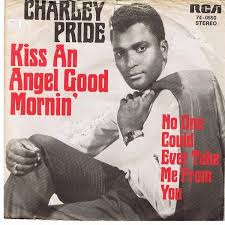
"Kiss an Angel Good Mornin'" is a song written by Ben Peters, and recorded by American country music artist Charley Pride. It was released in October 1971 as the first single from the album Charley Pride Sings Heart Songs. The song has since become one of his signature tunes and was his eighth song to reach number one on the country charts. It was also Pride's only single to reach the Top 40 on the pop charts, peaking at #21 on the Billboard Hot 100, and also went into the Top Ten of the Adult Contemporary charts. It also reached #19 on the U.S. Cash Box Top 100. The song spent four months on the pop chart, longer than any of his other hits. Billboard ranked it as the No. 74 song for 1972.

"Take Good Care of Her" is a 1961 song written by Arthur Kent and Ed Warren and recorded by Adam Wade. It reached number twenty on the R&B charts and number seven on the Hot 100. In the song, the narrator speaks to the groom of his ex-girlfriend.
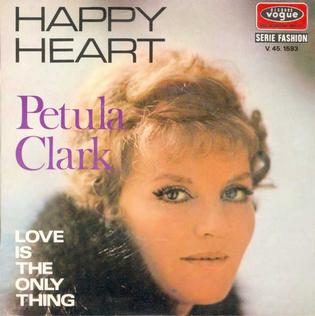
"Happy Heart" is a song written by James Last and Jackie Rae. Versions of the song by Petula Clark and Andy Williams charted simultaneously in 1969 and had their best showings on Billboard magazine's Easy Listening chart, where Clark peaked at number 12 and Williams spent two weeks at number 1.

Love Story is a compilation album by American pop singer Andy Williams that was released in the UK in July 1971 by the CBS Records division of Columbia and was mainly composed of tracks that had not been included on his studio LPs.

You've Got a Friend is the twenty-eighth studio album by American pop singer Andy Williams, released in August 1971 by Columbia Records. The album bears a striking resemblance to the Johnny Mathis album You've Got a Friend released that same month. Besides sharing their name, the two albums are both made up of covers of easy listening hits of the time, with 11 songs each, and the two albums have seven songs in common that are positioned in a similar order.

The singles discography of Elvis Presley began in 1954 with the release of his first commercial single, "That's All Right". Following his regional success with Sun Records, Presley was signed to RCA Victor on November 20, 1955. Presley's first single with RCA, "Heartbreak Hotel", was a worldwide hit, reaching the No. 1 position in four countries and the top 10 in many other countries. Other hit singles from the 1950s include "I Want You, I Need You, I Love You", "Don't Be Cruel", "Hound Dog", "Love Me Tender", "Too Much", "All Shook Up", "(Let Me Be Your) Teddy Bear", "Jailhouse Rock", "Don't", "Wear My Ring Around Your Neck", "Hard Headed Woman", "One Night", "(Now & Then There's) A Fool Such as I", and "A Big Hunk o' Love". On March 24, 1958, Presley entered the United States Army at Memphis, Tennessee, and was stationed in Germany. He left active duty on March 5, 1960.
"Skinny Legs and All" is a song composed and recorded by soul singer Joe Tex and released in 1967 on the Dial label in 1967. The single was later featured on Tex's "live" album, Live and Lively a year later in 1968.

You've Got a Friend is an album by American pop singer Johnny Mathis that was released on August 11, 1971, by Columbia Records. The phrase "Today's Great Hits" can be found above the title on both sides of the record jacket as well as both sides of the LP label as if to emphasize that this is essentially an album covering songs that were recently on the charts. This was a common practice of many vocalists of the period, so much so in fact that fellow Columbia artist Andy Williams also released an album titled You've Got a Friend in August 1971 on which he coincidentally covers seven of the 11 tracks that Mathis recorded for this album.
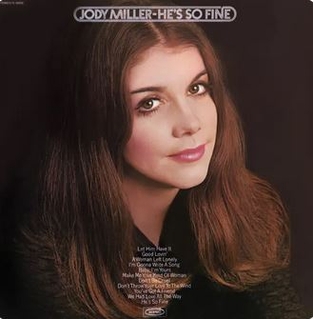
He's So Fine is a studio album by American singer Jody Miller. It was released in August 1971 via Epic Records and contained 11 tracks. A majority of the album's material were covers of country and pop songs. Two of its covers were originally released as singles: the title track and "Baby I'm Yours". Both reached the top ten of the North American country charts and reaches other chart positions. The album itself reached the top 20 of the American country chart in 1971.

Miss Country Soul is a studio album by Australian singer Diana Trask. It was released in February 1969 by Dot Records and consisted of 12 tracks written entirely by American soul artist Joe Tex. The album was marketed as a country recording and reached the top 40 of the US country chart. Of its two singles, "Hold What You've Got" was the only one to chart, making the US country songs chart in 1969. The album itself received positive reviews from Billboard and Cash Box magazines.
References
- ↑ "Breakout Singles". Billboard. December 12, 1964. p. 30.
- 1 2 Marsh, Dave (1989). The Heart of Rock & Soul: The 1001 Greatest Singles Ever Made. Plume. p. 187. ISBN 0-452-26305-0.
- ↑ Whitburn, Joel (2004). Top R&B/Hip-Hop Singles: 1942-2004. Record Research. p. 574.
- ↑ Whitburn, Joel (2013). Joel Whitburn's Top Pop Singles, 14th Edition: 1955-2012. Record Research. p. 835.